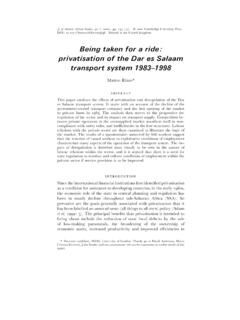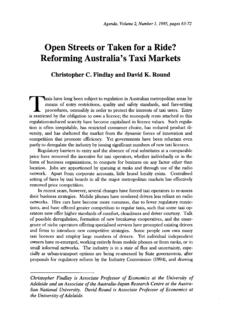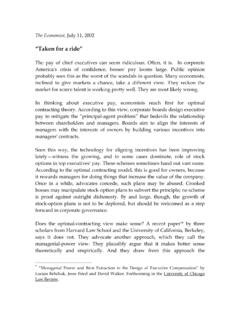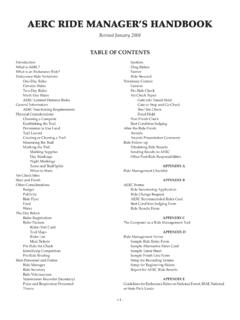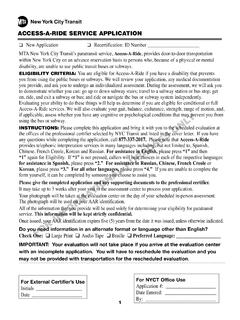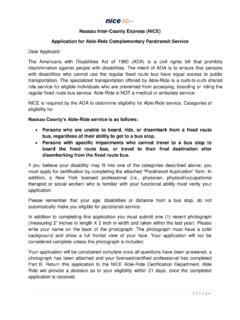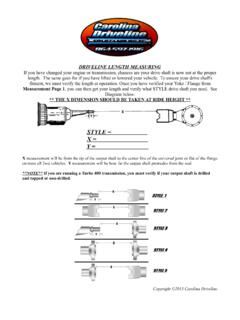Transcription of July 17, 2006 TAKEN FOR A RIDE: ECONOMIC EFFECTS OF …
1 July 17, 2006 TAKEN FOR A ride : ECONOMIC EFFECTS OF CAR rental EXCISE TAXES William G. Gale, and Kim Rueben, Deputy Director & Senior Fellow Senior Research Associate The Brookings Institution Urban Institute This paper was prepared for Enterprise Rent-A-Car as a private consulting project undertaken by the authors and was not associated with their affiliations with the Brookings Institution, the Urban Institute, or The Tax Policy Center. The views expressed are our own and should not be attributed to the officers, trustees, or staff of the Brookings Institution, the Urban Institute, the Tax Policy Center or any other organization.
2 We thank Pedro Cerdan-Infantes and Misha Dworsky for outstanding assistance. 1 I. Introduction The taxation of rental car usage has increased dramatically in recent years. Currently, there are at least 80 car rental taxes in effect in 38 states and the District of Columbia. These are excise taxes that are above and beyond standard retail sales taxes, vehicle licensing fees, and other appropriate taxes and fees. In addition, new car rental taxes are under consideration in at least 24 states. This paper analyzes several aspects of the economics of car rental excise taxes, emphasizing the following questions: Why is the use of car rental taxes increasing? Are actual and proposed car rental excise taxes economically sound means of collecting public monies?
3 Does the taxation of the customers of one industry place an unfair and disproportionate burden on too few members of society to fund a public project? What are the EFFECTS of car rental excise taxes on local consumers and businesses? Growth in car rental excise taxes The rise in car rental excise taxes can be traced to at least three factors: 1) the escalating revenue needs of state and local government; 2) the decisions made in many cities to provide public subsidies for the construction and renovation of professional sports facilities; and 3) the common misconception that such taxes are painless for local residents. This study demonstrates that none of these factors justify the structure or even the existence of separate car rental taxes (except in those instances where car rental taxes are paid in lieu of traditional taxes on all vehicles).
4 2 A principal factor behind the increase in car rental taxes stems from the broader ECONOMIC downturns earlier in the decade which, in turn, increased pressure for new sources of tax revenues at the state and local levels throughout the country. Although additional revenues may well be needed, new (and existing) taxes should be designed to promote equity, simplicity, and ECONOMIC prosperity. Our view is that car rental excise taxes fail all of these tests. Unsound tax policy A standard view of tax analysis is to create a broad tax base to spread the burden to all who draw benefits from the project or purpose being funded with tax dollars. A broad tax base also allows taxing authorities to maintain low marginal tax rates.
5 States and localities, in their recent efforts to shore up revenues, appear to have strayed significantly from these precepts. In particular, many car rental taxes represent additional levies above and beyond regular state or local sales taxes and other standard costs such as vehicle licensing fees. Piling taxes onto car rental customers is, in general, both inefficient and inequitable. It is inefficient because it can distort the choices people make regarding what mode of transportation they use. It is inequitable because it is unclear why users of one particular business or service should bear a disproportionate cost of financing government. Although steep taxes on particular goods can be justified in some particular cases, the conditions for such taxes are not evident in the rental car market.
6 For example, if the production or consumption of a particular good generates significant environmental degradation, then a pollution tax could be used to align the individual s costs of using the good with the social costs for dealing with added pollution. But there is no reason to 3 believe that rental cars have a different effect on the environment than owner-driven cars, so environmentally related taxes should not apply to rental cars above and beyond the extent they apply to owner-driven cars. Perhaps the most telling comparison is with cigarette taxes. Cigarette taxes raise taxes on a single good, but the explicit goal of such taxes is to reduce cigarette consumption indeed, the tax is commonly called a sin tax.
7 The reduction in cigarette consumption in turn can improve public health and reduce government health expenditures. It is by no means evident, however, why lower usage of rental cars would generate broader public benefits, nor why renting a car should be considered a sin. Funding sports facilities A second factor behind the increase in car rental taxes is that increased efforts to attract and retain professional sports teams have led many cities increasingly to finance the construction and renovation of sports stadiums via public means. It has become normal practice for state, city, and local governments to subsidize an enormous amount of construction and renovation of indoor sports arenas and outdoor sports stadiums in the United States.
8 Public subsidies are generally advocated on the basis that the stadium will prove to be an engine of ECONOMIC development that brings new spending into a city, creates jobs, and attracts new businesses by improving a city s image. Yet almost without exception, economists who have examined these claims have failed to find empirical support for any of these supposed positive EFFECTS . In the absence of broad ECONOMIC gains, the most economically appropriate financing mechanism would be private investment by team owners and their backers, so that customers from one industry are not being coerced into subsidizing the profit 4 margins of another. In instances where cities do choose to provide public financing, this same absence of broader external benefits implies that they should finance the stadiums with user fees, such as taxes on tickets.
9 With a user tax, the people who benefit from the investment would pay its costs. Instead, governing authorities all too often assemble a hodgepodge of unrelated taxes, fees, and levies. Stadium financing deals accordingly tend to violate principles of sound tax policy: Because the costs of stadium construction are distributed in a way that bears little or no relation to the distribution of the benefits received, these arrangements are generally highly inequitable. Today, there are at least 35 sports stadiums (either in existence, under construction, or being discussed) that are (or will be) funded in part by a tax on rental car customers, despite the fact that rental car customers derive no unique benefits from these facilities.
10 Ultimately, it is the people who live in a city or state who will make the decision as to whether it is appropriate to use tax dollars to fund sports stadiums and arenas. But if such public funding is deemed necessary, the funding mechanism should be one that spreads the financial burden to all in society who derive benefit. Car rental excise taxes fail that test. Who really pays? A third factor behind the increase in car rental excise taxes is the widespread perception that such taxes are paid by tourists or business travelers and hence are not shouldered by local residents and businesses. This perception has made car rental excise taxes look like easy money for local governments in need.
